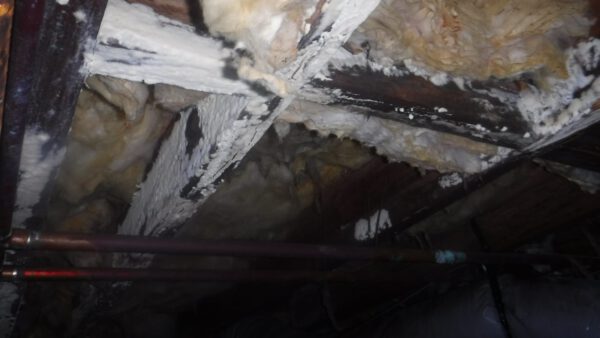It’s More Than A Musty Smell in Your House
Perhaps it’s happened to you: you and your buyer arrive at a showing and the home has been empty for some time. You open the door and there’s a musty smell in the home that hits you like a wave. Some may choose to ignore it, but brushing off a room that smells musty can lead to bigger problems, potentially opening yourself up to a lawsuit. The BrickKicker is here to explain what mold smells like and how to deal with musty odors head on.

What Causes a Musty Smell in a Home?
The most likely cause of a musty smell in a home is mold. Actively growing molds release Microbial Volatile Organic Compounds (MVOCs) that frequently have a distinct odor. The good news is that when damp conditions in a closed-up house cause mold or mildew to grow, it is usually someplace you can see it. If the mold was caused by a leak or long term-persistent moisture, it could be growing under floorboards, behind walls, under wallpaper, or in the ductwork on dust and debris that has settled there.
Most molds need four things to grow:
- an organic substrate to grow on
- temperatures between 40-120 degrees
- the presence of mold spores
- moisture
Three of the four of these are outside a homeowners ability to control or change. We keep the temperature in our home well within that range. We track mold spores into our house from the outdoors on our shoes and in our pets’ fur. They also float in freely every time we open a door or window. Occasionally, mold may grow on our expired bread, produce, or house plants. Though mold loves to grow on wood, it can also grow on dust particles.
Moisture is the only factor we can control in stopping or preventing mold growth and rooms that smell musty. Because mold can grow within 24-48 hours of coming in contact with moisture, it is imperative that water intrusion is promptly remedied.
What Does Mold Smell Like?
If your room smells musty, there’s a good chance that mold is present. What does mold smell like, other than “musty”? Mold is often described as having a pungent, earthy scent, similar to rotting wood or wet socks. Just thinking about mold brings on unpleasant senses such as things that are damp, sour, or expired. Basements are most likely to exhibit this undesirable smell, as well as old homes that don’t have proper ventilation.
Bleach is a good product to help eliminate the smell of mold, though if you have a significant mold infestation, we recommend bringing in a mitigation professional who can help you find the source of your mold problem.
Where Does Mold Come From?
Mold is found everywhere in nature. Like mushrooms, its purpose is to break down wood, leaves and other plant material into nutrient-rich dirt. Mold is made up of tiny, generally transparent filaments called hyphae. As these hyphae take in nutrients from the substrate they are growing on they create a fuzzy blanket called mycelium. This is when molds become visible. As the mycelium reaches the next stage of development it is ready to spread. To do this it creates and distributes spores. (A lot of spores.) To correctly classify the genus or species of mold laboratory testing must be done, however, identification is probably unnecessary if you intend to have it cleaned up.
Is Living With Mold Dangerous?
Breathing in mold spores can cause health problems for some individuals. The symptoms of mold-related illness are frequently respiratory issues, irritated eyes, rashes, sinus congestion, sneezing and headaches. There are certain types of molds that release mycotoxins that have been known to cause severe neurological problems.
Whether or not individuals are affected by mold is dependent on a number of factors:
- the type of mold
- the nutrient source
- the duration and severity of exposure
- the sensitivity of the individual
At greater risk are people with compromised immune systems, asthma, the elderly, small children and pregnant women. If you are concerned about a musty smell in your home, you can schedule an inspection to conduct proper mold testing.
Work with The BrickKicker to Put an End to Rooms Smelling Musty
At The BrickKicker, we believe that every home inspection should also be a mold investigation. Our inspectors are trained to look for visible mold in the areas of homes where mold is likely to grow. We recommend following EPA guidance when it comes to mold testing and remediation. When we find mold, we recommend having it cleaned up. We do not sell remediation services nor do we recommend expensive testing to confirm what we already know. If your clients have a history of respiratory issues we can certainly provide quantified microbial measurements using a method appropriate for the observation or the concern. The BrickKicker also offers indoor an air quality test that can be done on homes outside the scope of a real estate transaction. Schedule an inspection today!
